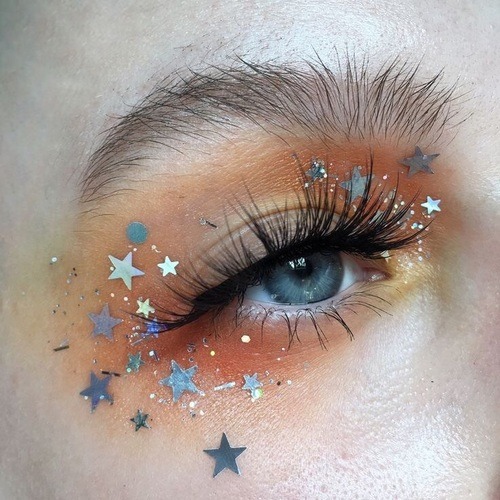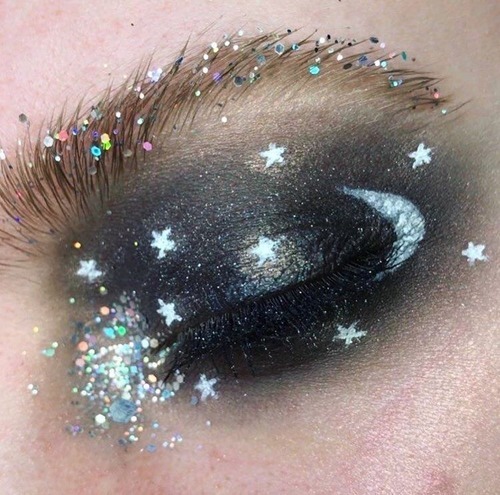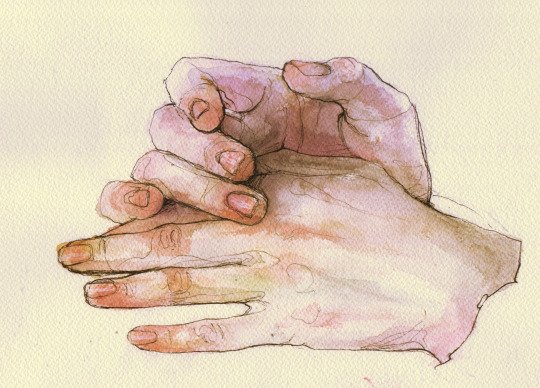Photo










⠀⠀💌 ʏᴏᴜʀ ɴᴀᴍᴇ ʜᴇᴀᴅᴇʀs (⋆❛ ہ ❛⋆)! ♡ *:
⠀⠀♡ ˡᶤᵏᵉ ᵒʳ ʳᵉᵇˡᵒᵍ ᶤᶠ ʸᵒᵘ ᵘˢᵉ/ˢᵃᵛᵉ。
⠀⠀♡ ᵖˡᵉᵃˢᵉ ᵈᵒ ᶰᵒᵗ ʳᵉᵖᵒˢᵗ ᵐʸ ᵉᵈᶤᵗˢ。
842 notes
·
View notes
Photo
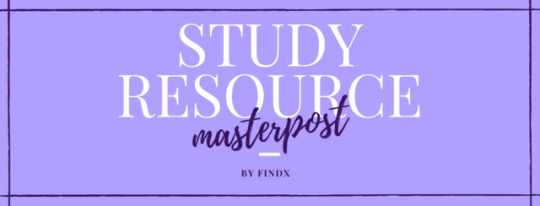
Study Resource Masterpost, by findx
Hi everyone! Here’s a masterpost on study resources; lots of these helped me during my freshman year at MIT. Happy studying, may you all get the results you deserve :)
HOW TO:
study efficiently
succeed in college
take notes from a textbook
be productive
take visual notes
create flashcards
memorize content
study well
organize your desk
do well in math class
study math outside of school
get A+ in math
study for math exams
write an academic essay
write an essay like a pro
structure an essay
find that word you just can’t seem to remember
do well in physics
ace your foreign language class
learn biology
study geography
cram economics
find items at libraries near you
survive the end of the semester
survive finals
reduce stress during finals
FREE WEBSITES:
quizlet for flashcard creation
cram.com for pre-made flashcard sets
slader for textbook solutions
easybib for citation making
grammarly for proofreading
duolingo for language learning
conjuguemos for foreign language conjugations
codeacademy for simple computer programming
sparknotes for study guides and modern English translations of Shakespeare’s plays
cliffsnotes for literature study guides
wolframalpha for math and science calculations
khan academy for well-explained lectures about anything
edx for online courses from universities
2K notes
·
View notes
Text
10 Lessons from a Decade of Writing
Over the last decade, I graduated from high school, got a bachelor’s in writing, earned an MFA in fiction, and started working as a copywriter.
In that time, I grew a lot as a writer — so I thought I’d share the lessons that helped me most along the way!
How does one from each year sound?
2010: Don’t let high expectations be a barrier to good writing
As a teenager, I had unhealthy expectations for my writing. This not only made writing painful, but also held back the quality of my work. Thankfully, in my last year of high school, I had to crank out a short story for a class, with no time to revise as I went. The result? I had fun, and ended up writing a story that was better than anything I’d written before it. That’s when I realized how toxic lofty expectations could become, if left unchecked.
2011: Good stories often depict, or inspire, change
In my first college writing workshop, our professor (of “It’s never about the bread” fame) told us that a good story often does one of two things: it either depicts a change in a character, or inspires a change in the reader. While a bit simplistic, that guidance was invaluable to me at the time. The first option gave me a clear target to aim for in workshop, while option two exposed me to the full, baffling mystery of what makes a story worth telling.
2012: Clear, specific language brings scenes to life
As a sophomore, I fell in love with Raymond Carver’s minimalism and was particularly struck by the following description from “What We Talk About When We Talk About Love”:
Mel handed me the saucer of limes. I took a section, squeezed it over my drink, and stirred the ice cubes with my finger.
The description struck me as remarkably vivid, yet lean — making me realize how a small description could breathe life into a scene when written with clear, specific language.
2013: Personal experiences fuel good writing
After years of avoiding the genre, I took my first poetry workshop as a junior, and SURPRISE. I loved it. It was the first time I’d ever really tried writing about my own experiences, and it brought an invigorating sense of reality to both my poetry and my fiction. It also inspired me to become more observant, which fed back into my writing and made me better appreciate life’s little moments.
2014: Never mow the same grass twice
Throughout college, I had a trumpet instructor who’d often say, “Michael, I hate to mow the same grass twice!” You can find a full explanation here, but long story short, he encouraged me to fix flaws in my performance immediately upon discovering them, because if you repeat mistakes, they become habits. Bad habits that only get harder to break over time.
I didn’t take his advice to heart in my music, but I did apply it to my fiction. In the coming years, it would be instrumental (ha) in honing my craft.
2015: How to tie plot to character growth
In high school, my stories were all plot. In college, my stories were all character. During the first year of my MFA, I learned how to merge the two, by writing narrators with:
Emotions that drive actions,
Actions that trigger consequences, and
Consequences that compel growth.
This structure is simple, but effective, particularly when your character is motivated by a clear emotional struggle. More about this structure here.
2016: Write the stories that excite you
Throughout college, I almost exclusively wrote non-genre stories, because I wanted to pursue particular goals in that space. I learned a lot in the process, but it wasn’t until the second year of my MFA that I realized my stories themselves had lost a certain spark. So I switched back to writing the genre stories I loved. Like an old friend, the spark came back — and the writing got a lot more fun.
2017: Accept that you’ll never catch up to your expectations
The great irony of being a writer is that the more you hone your craft, the further away “perfection” seems. Why? Because as we improve, we not only overcome weaknesses, but also discover the flaws we never knew existed. So we fix those flaws. Discover new ones. Fix them. And so on. It’s a frustrating, never-ending cycle, and it wasn’t until my final year of the MFA that I was able to fully accept it — finding comfort in the fact that my dissatisfaction was a sign of growth.
2018: Be willing to let stories go
In my first year as a copywriter, the fast pace of agency life quickly taught me the importance of knowing when to “let go” of my writing. At work, it was because I had deadlines. But in fiction, I realized I couldn’t keep revising the same stories forever, when others were waiting to be written. “Art is never finished, only abandoned,” said Leonardo da Vinci, and it’s true. Our stories will never be perfect, so it’s our responsibility to decide when it’s time to cut the cord.
2019: If you want to write meaningful stories, start with what’s important to you
After my fiction professor gave that brief explanation (back in 2011) of what made a good, meaningful story, I became obsessed with finding a clearer answer. Something to grasp onto to guide my writing.
But this past year, I realized it was a bit of a fool’s errand. The things that make a story worth telling are incredibly subjective and different for everyone — naturally arising from their backgrounds, desires, fears, and more.
You can’t predict it. Or at least, you can’t predict it well.
So you just need to look inward. To find what you think is important.
And then write.
2020: TBD
Cheers to a new decade, everybody! May we keep honing our craft and fill the years to come with incredible stories.
— — —
Your stories are worth telling. For more helpful tips on how to craft meaning, build character-driven plots, and grow as a writer, follow my blog.
1K notes
·
View notes
Photo

I decided to create a masterpost that would help you with what you are struggling with. Hopefully any of the links below will help you!
Reminder; You’re going to be okay. What you are going through will pass, just remember to breathe.
————————————————————————————-
Distractions;
Here are some distractions to help keep your mind occupied so you aren’t too focused on your thoughts.
-Draw something
-This website translates the time into colours.
-Create your own galaxy.
-Play flowing.
-Make a 3D line travel where ever you like.
-Listen to music.
-Calm.
-Ocean mood, do nothing for two minutes.
Sleep issues;
- 8 hour sleep music.
-Rainy mood.
-Meditation.
-Coping with nightmares.
-How to cope with nightmares, 11 steps.
-Calm
-Foods that can affect your sleeping, both positive and negatively.
Uncomfortable with silence;
-Rainy mood.
-10 hours of rain and thunder.
-3 hours of rain and thunder.
-Human heartbeat.
-Rainforest.
-Sound of rain on a tin roof.
-Autumn wind.
-Rain on a tent
-Traffic in the rain.
-Soft traffic.
-Fan.
-Train.
-Simply noise.
-My noise.
-Rainy cafe.
Anxiety;
-How to stop worrying.
-Tips to manage anxiety and stress.
-The 10 best ever anxiety management techniques.
-Self-help strategies for anxiety.
-Helping a friend with anxiety.
-All about worrying.
-8 myths about anxiety.
Sad, angry and depressed/depression;
-“I’m always sad”
-Feeling sad.
-Going through trauma.
-“I’m always angry”.
-Anger management.
-All about anger.
-National helplines and websites.
-Self-help strategies for depression.
-Dealing with depression at work.
-Dealing with depression at school.
Isolation and loneliness;
-Pets and mental health.
-All about loneliness.
-“I feel so alone”
-10 more ideas to help with loneliness.
-How to deal with loneliness.
Self-harm;
-Alternatives to self-harm and distraction techniques.
-146 things to do besides self-harm.
-More alternatives to self-harm.
-Self-harm alternatives.
-How to take care of self-harm wounds/injuries.
-Getting rid of scars.
Addiction;
-How to help a friend with a drug addiction.
-What is addiction?
-All about alcohol and addiction.
-The facts about drug addiction.
Eating disorders;
-Helping a friend with an eating disorder.
-Eating disorder treatments.
-Support services for eating disorders.
-Self-help tips with eating disorders.
-Eating disorder recovery.
-Recovering from an eating disorder.
-100+ reasons to recover.
-Understanding and managing eating disorders.
Dealing with self-hatred;
-3 ways to ease self-loathing.
-How to turn self-hatred into self-compassion.
-Self-hatred resources.
-10 step plan to deal with self-hate.
Suicidal;
-International suicide hotlines (1) (2)
-Preventing suicide.
-Reasons to stay alive.
-Dealing with suicidal thoughts and feelings.
-Coping with suicidal ideation.
Schizophrenia;
-All about schizophrenia.
-Helping a person with schizophrenia.
-Understanding and dealing with schizophrenia.
-Delusions and hallucinations.
OCD;
-Managing your OCD at home.
-Overcoming OCD.
-How to cope with OCD.
-Strategies for dealing with the anxious moments.
Borderline personality disorder;
-Helping someone with BPD.
-All about personality disorders.
-Treatment for BPD.
Abuse;
-Healthy relationships VS abusive relationships.
-Emotional abuse
-Overcoming sexual abuse.
-Hotlines services.
-5 ways to escape an abusive relationship.
-Domestic violence support.
-Signs of an abusive relationship.
-What do to if you’re in an abusive relationship.
-Surviving abuse.
-What you can do if you’re sexual harassed.
-Sexual assault support.
-What to do if you’ve been sexually assaulted or abused.
Bullying;
-How to stand up against bullying.
-How to protect yourself when it comes to cyber bullying.
-How to help stop people bullying you.
Loss and grief;
-How to cope with a suicide of a loved one.
-Grieving for a stranger.
-Common reactions to death.
-Working through grief.
(Other loss and grief)
-Moving away from friends and family.
-Coping with a breakup.
Getting help;
-Seeking help early.
-All about psychological treatments.
-Types of help.
-All about age and confidentiality.
Things you need to remember;
- Don’t stress about being fixed because you’re not broken.
-Remember to remind yourself of your accomplishments. Tell yourself that you’re proud of yourself, even if you’re not.
- This is temporary. You won’t always feel like this.
-You are not alone.
-You are enough.
-You are important.
-You are worth it.
-You are strong.
-You are not a failure,
-Good people exist.
-Reaching out shows strength.
-Breathe.
-Don’t listen to the thoughts that are not helping you.
-Give yourself credit.
-Don’t be ashamed of your emotions, for the good or bad ones.
-Treat yourself the same way as you would treat a good friend.
-Focus on the things you can change.
-Let go of toxic people.
-You don’t need to hide, you’re allowed to feel the way you do.
-Try not to beat yourself up.
-Something is always happening, you don’t want to miss out on what’s going to happen next.
-You are not a bother.
-Your existence is more than your appearance.
-You are smart.
-You are loved.
-You are wanted.
-You are needed.
-Better days are coming.
-Just because your past is dark, doesn’t mean your future isn’t bright.
-You have more potential than you think.
- Your value doesn’t decrease based on someone’s inability to see your worth.
Please remember to look after yourself and know that you are more than worth it and you deserve to be happy. Keep smiling butterflies x
979K notes
·
View notes
Text
Bad Things Happen Bingo 2019 Master List
Bad things Happen Bingo February 2019 (& Continuations)
(This post may be updated if any more continuations are requested.)
1 - Starvation
1a - Continuation
2 - Interrogation
3 - Collared and Chained
4 - Carved Mark
5 - I Will Punish Your Friend For Your Failure
6 - Dragged by the Ankle
7 - Lifted by the Neck
8 - This Is For Your Own Good
9 - Caught in an Explosion
10 - Tied to a Chair
11 - Slammed into a Wall
12 - Blood From the Mouth
13 - Strapped to an Operating Table
13a - Continuation
13b - Continuation #2
14 - Stranded and Lost
14a - Continuation
15 - Setting a Broken Bone
15a Continuation
16 - Ambush
16a - Continuation
17 - Working Through the Cold
17a - Continuation
18 - Burns
19 - Thwarted Escape
20 - Stabbed
21 - Bloodstained Clothes
21a - Continuation
22 - Buried in Rubble
23 - Memory Loss
24 - Locked in a Freezer
24a - Continuation
25 - I Have You Now My Pretty
Like my stuff and want to support what I do? Then maybe consider buying me a Kofi? Ko-fi.com/morallygrey
156 notes
·
View notes
Photo


ALRIGHT. LISTEN UP.
So recently, I got calls from the phone number, (937) 353-8319. They claim to be a job service, and one of their “employees”, Carrigan, is friends with whoever the call recipient is, and that Carrigan has recommended you for this $15.00/h “job”. I also got a text message from (937) 607-1493, claiming to be Carrigan, and that they need stuff to “win a scholarship”. I do not know anyone by the name of Carrigan and I know very well that this is a very dangerous scam.
If you receive a call from a number, and they ask you if you would like a job for $15.00/h, HANG UP IMMEDIATELY. If you accept the “job” offer, and you go in for an interview, they will give you a drugged bottle of water and you will wake up somewhere you don’t want to be.
These phone calls & texts are from a human trafficking service, and if you oblige to them, you will be sold to people and you will be raped, no doubt about it. So PLEASE PLEASE DO NOT ANSWER THESE CALLS OR TEXTS. I have listened to the voicemails, and allowed my dad to do the same, and he learned that anyone offering a $15.00/h “job” is a human trafficker.
PLEASE SIGNAL BOOST THIS ALL OVER TUMBLR
352K notes
·
View notes
Text
Fic authors deserve more credit.
Story time: I started a book about 23 hours ago and just finished it. Also in that time I slept for 10 hours, spent time with family, was at work, etc. Anyway, I enjoyed the book (Simon vs. the Homo Sapiens Agenda). But it felt like it flew by, so after I finished I looked up the word count because what are pages? Pages are meaningless. I only function in word counts anymore.
The estimate I found was 58,580. My immediate reaction was “oh, that’s why. That’s nothing!” But what a shitty response. Because no. That’s not nothing. That’s a whole. Damn. Book. An entire novel! And Fic authors regularly bust out 30k, 50k, 100k, 150k words. AND THEY DO IT FOR FREE. WHILE WORKING AND LIVING THEIR LIVES.
So anyway, thank your favorite fic author today because they deserve it. Because they’re amazing. They’re the MVPs.
153K notes
·
View notes
Photo

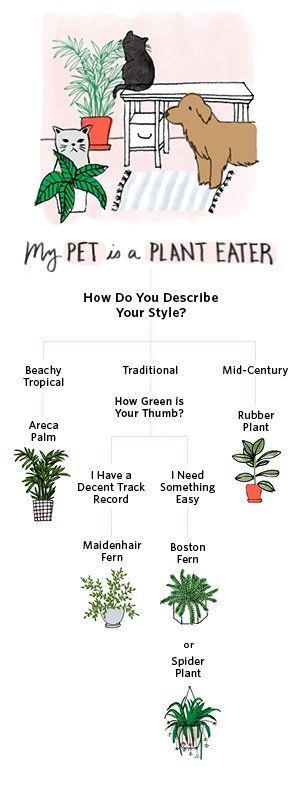
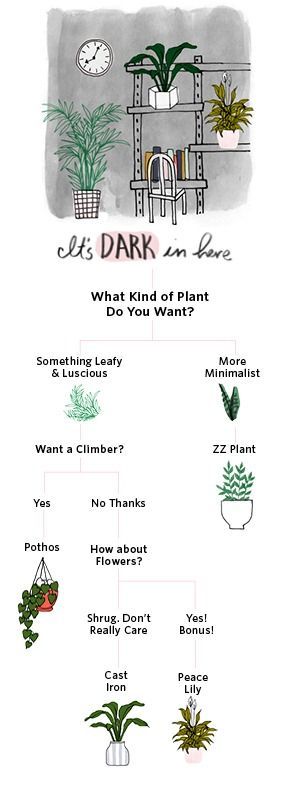
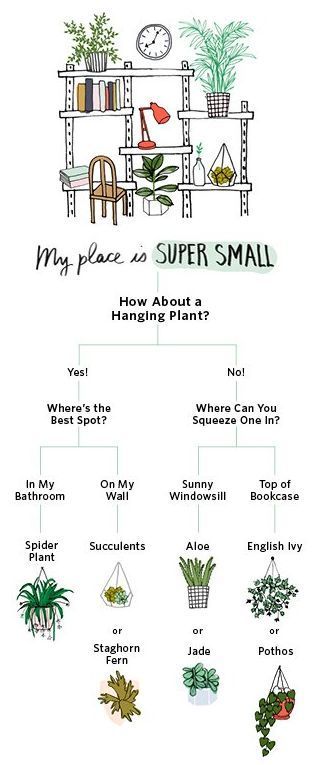
Funny way to find out which plant you might like to buy.
Source: apartmenttherapy.com
324K notes
·
View notes
Text
please make sure that wherever you’re at in life, you don’t treat it like a transitory period. don’t waste your college years wishing to already be graduated & have a job. don’t waste your single years wishing for someone to be in love with. if/when those things come, they will come in due time and they will be good. but there is nothing like looking back and feeling empty because you wasted literal years ignoring what you had because you were hoping for something better. while it’s important to better yourself and reach for your goals, don’t neglect the present because that’s where you are now and it’s your now that determines your future.
295K notes
·
View notes
Text
Character Development: Speech
Finding your character’s voice is one of the most important things you can do to make your character more fully developed. It can often be the thing that sets your character apart and makes the reader easily able to identify them. Creating your character’s voice breathes life into them.
What to think about:
Formal or informal
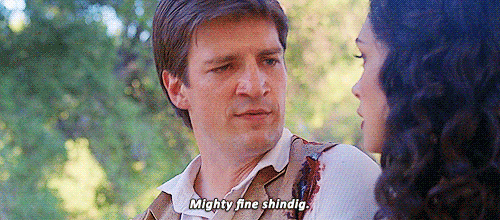
Can be shown with:
sentence structure/complexity (shorter vs. longer sentences, number of clauses, etc.)
contractions (e.g. y’all versus you guys, I am vs. I’m)
word choice (simple or advanced; more poetic vs. more practical, blunt vs. subtle)
word order/syntax (can indicate dialect and/or formality)
Things to ask yourself:
- If my character speaks formally/informally, is there a reason?
- Does it indicate their status?
- Or is it a rejection of their status? (e.g. does your highborn character prefer to speak informally because they hate their position in life, or does your lower class character speak more formally to make themselves appear higher class?)
- Is the way they speak normal for their society? In other words, if your character is, say, an alien from a highly formal culture, they won’t think of themselves as speaking abnormally. But if they visit another, less cultured planet, they’ll stick out like a sore thumb.
Catchphrases
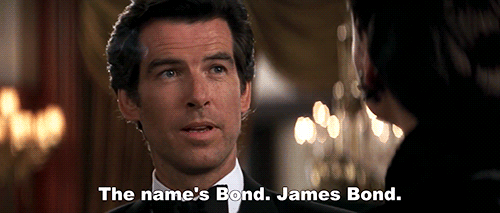
When done well, this can be amazing. When done awfully, it makes the reader sigh and roll their eyes in exasperation. So, be careful not to overdo it!
Catchphrases can include:
slang (e.g. wicked, if your character is from Boston, like Faith Lehane from Buffy: the Vampire Slayer)
exclamations/swears (”Hell’s bells!” - Harry Dresden, “Zoinks!” - Shaggy, “Holy ___, Batman!” - Robin at various times)
automatic responses (such as in response to how they are, e.g. “Five by five.” - Faith Lehane, or in response to a question they don’t want to answer, e.g. “Spoilers!” - River Song)
greetings/goodbyes (”Hello, sweetie.” - River Song, “What’s up, Doc?” - Bugs Bunny)
introducing themselves ( “The name’s Bond. James Bond.” - James Bond, “Trust me. I’m the Doctor.” - the Doctor, “Denny Crane,” said repeatedly by Denny Crane)
an explanation/repeat phrase of some other classification (”Dammit, Jim, I’m a doctor, not a ________.” - Bones, “Your mission, should you choose to accept it…” - Mission Impossible, “Live long and prosper.” - Spock, “Same thing we do every night, Pinky! Try to take over the world!” - the Brain)
A lot of times, these catchphrases can become inside jokes, and merely referencing them is enough (think: “It’s a bird! It’s a plane! It’s Superman!” or “Holy _______, Batman!”).
But sometimes, it can feel a little forced (like Miss Martian’s constant use of “Hello, Megan!” all the time in Young Justice). You want to use these catchphrases sparingly, and when they make sense. While you and I might say “fudge” or another such exclamation any time we trip, the reader does not want to read that twenty times in the same chapter because your character is a klutz. This is the art of writing, not the hyperrealism of writing. You want it to mean something, so use it only when needed.
Things to ask yourself:
- Does this character really need a catchphrase? How will this help establish character?
- Does the catchphrase come from the type of place they live or things they do? For instance, Harry Dresden is a wizard, so when he swears he says, “Hell’s bells,” which reminds us of his job and difference from those around him. This wouldn’t be the same if he simply said, “Dang it,” any time he swore.
- Is there a reason they have a catchphrase? Is it deliberate or unconscious on their part?
- Is there a way you can flip the catchphrase and use it to signal a shift in the story or an unexpected twist (e.g. signifying that somehow your character as switched bodies with another person, like Faith from Buffy: the Vampire Slayer; alternatively, that something isn’t right with the character, because of certain events, and they’re not saying their usual catchphrase)?
Verbal Tics*
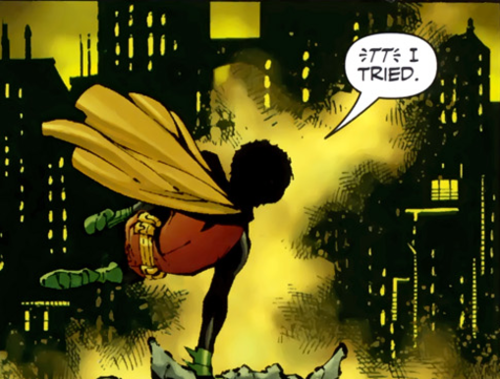
Verbal tics are sounds that are not really words, more like filler, that get used almost unconsciously in everyday speech. Words like “ehm,” “uh,” and so on are all verbal tics. (Various internet sites assure me that throat clearing and sniffing can also be included here, but I leave that up to you.) For this section, however, I am also including words, but only those words that are filler. I am also including alterations to the text that represent how someone is speaking.
Now, I know that in any writing guide you read, they want you to NOT, NOT, NOT use regular tics like these in dialogue. It’s annoying, repetitive, annoying, serves no purpose, annoying, and so on. In a sense, they are very much right. Don’t use verbal tics for every character! But using them to distinguish one character (or a couple, in different ways) can work very well if done right.
Verbal tics can be:
words (examples: “You don’t wanna mess with us, see, ‘cause we’re dangerous, see,” or “So, I went to the mall yesterday, and there was this dress, so I bought it, so…” or even “Like, I’m not even sure what Vanessa was, like, wearing at that party last night?”)
filler sounds (e.g. “eh,” “um,” “uh,” “er,” “hrrgh,” “urk,” and so on)
messing with the letters and format of the sentence (e.g. dragging out the letter, making every word separated for a slow speaker, running words together to indicate speed, etc.)
Examples of verbal tics (this is a section in which examples are very helpful, so here you go):
Damian Wayne, the current Robin at DC Comics: uses the distinctive sound “tt” in his appearances to express his emotions, even - tt - other comic series that he guest-stars in
Asmodeus from the Redwall series: drawsss out the letter ssss becaussse he isss a ssssnake
The Flash, at various points in DC Comics: speakswithallthewordstogetherbecausehe’stalkingsofast!!!
Canada, from the Hetalia anime: ending every sentence like a true Canadian, eh?
Things to ask yourself:
- What purpose would a verbal tic have for my character? Do they really need one?
- Is the verbal tic connected to an emotion, or is it involuntary? (Generally, in real life, it is involuntary, but once again, this is art, and so it can have meaning, if you so choose!) What emotion might it be connected to?
- Are they aware of it? Are they embarrassed by it? Do people make fun of them for it?
- Is it part of their dialect/culture?
- Is it a recent thing or have they always done it?
- Where is the balance between making it seem like a realistic tic and annoying my reader with the repetitiveness?
*I am not referring to any medical diagnoses here, although if you want to go right ahead and use medically diagnosed tics for a character, please feel free to! However, this section does not deal with those, as I am not an expert, although I understand there might be some confusion due to the terminology I have used. Please let me know if there is a different term I should be using instead, as I couldn’t find one anywhere. Thanks!
Ways of addressing others

The way that your character addresses other characters says a lot about how they view and respect those around them, in addition to their personality. In addition, if you establish a character addresses others in a certain way (say, by last name only), then when they break this pattern, the reader knows it is important.
Different ways of addressing others:
nicknames (either a shortening of someone’s name, even if it’s not usually shortened, or a name reflecting some characteristic of theirs - e.g. “Jane” to “Janie,” or “Shorty,” or Tony Stark’s brand of nicknames, like “Capsicle” or “Rock of Ages”)
titles (similar to nicknames, but more formal - e.g. a character referring to people by their rank, job, familial relations, etc.)
last name only
full name only (never shortened, includes first, last, and middle names)
no nicknames (never refers to a character by anything other than what’s printed on their birth certificate, can be combined with others on these lists, especially the previous two)
familial referencing (e.g. Aragorn, son of Arathorn)
insults (ranging from harmless to aggressive, can be combined with the first one on this list, not always swears)
by physical/personal characteristics [epithets]** (e.g. by gender, hair color, eye color, traits - for instance, “boy,” “you, redhead!” or “the only one of you with any spine”)
** This one tends to work best in stories set in older times or in sci-fi/fantasy. Epithets can be insults, but the epithets I am thinking of are more Homeric in nature.
Things to ask yourself:
- Is there a reason behind my character’s decision to address people in this way? Does it indicate a lack of trust? A need to crack jokes?
- What does this say about my character’s background? Is this the normal way to address people where they come from? Is it abnormal to do so in the place they are now?
- Does my character evolve from speaking this way? Do they start speaking in a different way, either deliberately or unconsciously? Why?
Accents

Accents are tricky. There are several different ways to write accents (I’m currently working on a post that explains them further), but basically no matter how you write an accent, there are a few things you can do to portray the accent.
slang (e.g. barbie = barbecue in Australian slang)
word order/syntax (e.g. “I’m after going to Mary’s” = “I just went down to Mary’s” in Hiberno-English)
contractions (I’ve versus I have, or y’all versus ye vs youse vs you and so on)
idioms (words or phrases that do not have equivalents in other dialects/languages/places)
diction (words meaning different things, like “chips” in American English and in British English)
verbs (e.g. “ain’t,” “be,” “runnin,” or mixing up tenses)
Keep in mind:
- be RESPECTFUL of whatever accent you’re trying to portray, especially if it’s not your accent
- don’t overdo the accent because it might end up sounding stereotypical (and that is not respectful - see above)
- you should get a feel for the accent you’re trying to write. Listen to the music, read something in that accent, watch/listen people talk in the accent until you hear the rhythm and way people with that accent talk.
Things to ask yourself:
- Is the way I am portraying this accent as accurate as it is within my power to make it? (In other words, have I done my research?)
- How does my character feel about their accent? Are they in a place where their accent is normal? Are they in a place where they stand out because of their accent?
- Continuing on that thought, how noticeable is their accent? Is it the equivalent of someone from, say, Boston going somewhere else in Massachusetts, or the equivalent of that person from Boston going to California, or the equivalent of that same person going to London? Each one becomes more and more noticeable the farther the person goes from their home.
- Has my character made an attempt to hide their accent? Deliberately intensify it? Or do they just not care?
- Does it get stronger or weaker based on their emotional state?
Emotion
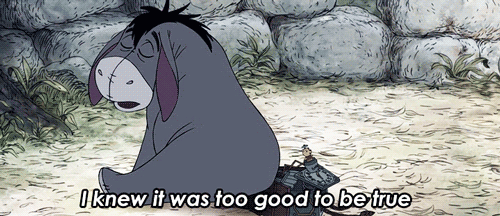
The emotions your character normally expresses when they’re speaking say a lot about their general emotional state. In addition, if there is a change in their emotional state, readers will be able to know that just from the way they talk (though context and body language are always useful!)
You can show emotion in speech through:
speed (if they’re easily excited, they might talk fast! and with a lot of exclamation points! But if they’re sad a lot…well, they might talk a bit more slowly and take their time…kind of like Eeyore.)
word choice (is it generally positive? negative? Or somewhere in between?)
reactions to other characters’ dialogue (are they generally patient and wait for the other person to finish? Or do they jump in because they’re so excited about something the other person has said?)
volume (are they loud? Quiet? Are they normally quiet but get loud when they’re angry? Or vice versa?)
understandability (not necessarily stuttering or stumbling over words, but can be; are their procession of thoughts/logic easy to understand? Is their conclusion sensible? Are they understanding others easily or do they need clarification? For instance, if your character is easily excited, maybe their dialogue comes in a jumble of words that is hard to understand. Maybe they’re so angry they’re not listening to anything the other person is saying, and their dialogue reflects that.)
punctuation/capitalization (are they unsure of themselves and what they’re saying a lot, so they use a lot of question marks like this? Are they aggressive in their emotions and so THEY SHOUT LIKE THIS!!! Are they…kind of thoughtful and take the time to…express themselves correctly…or are they - well - I mean are they - like - the kind of people who - you know, backtrack and correct themselves a lot?)***
***Again, you want to be careful not to overdo this, as it can get annoying AND lose the effect it has on the reader. If one of your characters SHOUTS. EVERYTHING. THEY. SAY. THEN WHEN SOMETHING REALLY IMPORTANT HAPPENS TO THE CHARACTER AND THEY GET VERY EMOTIONAL AND SHOUT, IT’S LOST A TON OF EMOTIONAL IMPACT ON THE READER. Like the end of that sentence. Did it make a big impact on you? It should - it was the entire point of the sentence. But it was lost amidst all of the other capitalized words. The same thing goes for any type of repeated punctuation/capitalization for a character - you want to make sure it counts.
Things to ask yourself:
- Why does my character express this emotion generally?
- What does it say about their outlook on life?
- What does that say about how they view other people?
- Does their dialogue rely on these techniques too much when trying to show their emotions? How can I combine these with their body language?
Focus/Fixations

This is a pretty simple one. Focus can be organization of thoughts - basically, what idea(s) can they or want to focus on. A character that is very focused might be a practical person who is focused on the here and now, and their plans for whatever situation they’re in. A character that is less focused might be someone who thinks of several things at once, which reflects in their dialogue.
Fixations are the things that their minds keep coming back to. So for example, if a character is worried about how they did on a test, throughout the story their dialogue might keep returning to that subject or referencing it. For instance: “Hey, when do you think we’re getting that test back?” or “Wow, this is pretty hard. Almost as hard as that test we took.” You want to make it less obvious than this, of course! (A good example is Anya from Buffy: the Vampire Slayer and her obsession with making money.)
Ways to show focus/fixation:
number of ideas/topics in their dialogue at a time
relevance of topics to the present
relevance of topics to the past/future
how they react to people who do not share their focus/fixation (e.g. a focused person finds it annoying when a person who is not focused keeps interrupting them, or a person who is less focused finds it annoying that a person who is focused is paying too much attention to one thing)
Things to ask yourself:
- How focused are they when talking?
- Do they think of a million things at once, or just one at a time?
- What are some short-term fixations they might have? Some long-term?
- Why might they be focused/not focused? Why might they have these fixations? What do these fixations say about their character?
- Do the focus/fixations change over time? How? Why? Does it reflect a change in their character?
- Am I making my character too focused/fixated on something? Is it detracting from or adding to the story or the character arc?
How others see them vs. how they see themselves
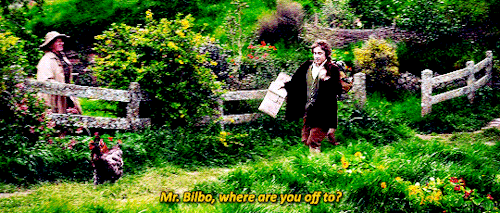
This one is probably the broadest one on the list. There aren’t specific things you can do to get this across (it’s more of a general thing), but it’s a cycle that you should keep in mind.
Your character sees themselves in a certain way. For instance, they might think of themselves as helpful, or kind.
The way that they see themselves can influence why they do things (e.g. if they see themselves as a person who doesn’t go on adventures, like Bilbo Baggins, they will refuse to go on an adventure.)
The actions that they take influences how other characters see them, but the other characters do not necessarily see your character’s perception of themselves (e.g. in the Hobbit, Bilbo sees himself as helpful and averting war by giving the Arkenstone to the Elves. He thinks he is being a good friend. However, Thorin sees it as a betrayal and thinks Bilbo is disloyal and not a good friend. Both of them at the time of their actions think they are right.)
How other characters see your character influences how they treat your character (e.g. Because Thorin thinks Bilbo has betrayed him, he threatens Bilbo and rejects him as a friend. Bilbo escapes with his life, but only through the help of the other dwarves. Again, to each character, their own actions are justified and so their dialogue reflects their belief that they are right. So, when they talk to each other, both of them think that they are right and the other is wrong, and you can see this in their dialogue.)
How they treat your character influences how your character sees and reacts to these people, and can influence your character’s perception of themselves (e.g. Because Thorin rejected Bilbo and called him a traitor, Bilbo is bewildered and believes for a time that Thorin cannot be saved, and he feels like he failed).
The cycle continues.
All of this is reflected in their dialogue to each other.
Knowing how each of your characters see each other and themselves will influence their dialogue and reactions to each other. Characters can misunderstand each other, underestimate someone, or help someone feel better about themselves, just to name a few things.
Things to ask yourself:
- How does my character see themselves? Why? Are they one hundred percent correct?
- How do other characters see my character? Why? Are they one hundred percent correct?
- Does my character have any idea of other people’s perceptions of them? If so, do they care? Is my character correct about what they think other people think about them?
- Will my character’s perspective of themselves/other people change? Why and how? Will other characters’ perspectives of my characters change? Why and how?
- How do all these reactions to each other influence the story?
Hope this helped! Let me know if there are any questions.
- Riona
15K notes
·
View notes
Text

Oh my God I’m not sure of the accuracy of this scale but I made one anyways.
1: Jane Austen. Theoretically Romantic, mostly a clever satirist more interested in the novel as the perfect vehicle for social commentary than in poetry for capturing emotion. Very little chance of swooning and/or dramatic death. A very safe spot on the Romanticism scale.
2: Dorothy Wordsworth: Actually a Romantic, though not excessively so! Enjoy your long walks in the country. Keep those diaries. Your brother can mine them for publishable material until people consider them finally worthy of academic interest a century or two later.
3: Wordsworth. May result in later becoming annoyingly conservative but mostly harmless. Go ahead and wander lonely as a cloud. Gaze upon that ruined abbey.
4: Charlotte Turner Smith. Recover that English sonnet and transform it into a medium that mostly expresses sorrow! Help establish Gothic conventions! Have what Wordsworth called a true feeling for rural England! Die in penury and be forgotten by the middle of the nineteenth century!
5: Blake. ?? Who even knows man. Talk to angels. Create your own goddamn religion. Confuse all of your contemporaries.
6: Mary Shelly. Go ahead and run off with that unhappily married poet who took you on dates to your mother’s grave, but this may result in carrying your husband’s calcified heart around in a fragment of his last manuscript the rest of your life. But also, arguably inventing sci-fi as a genre… so that’s some consolation.
7: John Keats: listen to that nightingale but be forewarned: you will die of TB in Rome and everyone will mock you for dying of bad criticism instead of, you know, infectious disease.
8: Coleridge. May result in never finishing a poem and a severe opium addiction.
9: Percy Shelly. May result in being expelled from Oxford and in premonitions of your own death by drowning.
10: Full Byron. Never go full Byron.
19K notes
·
View notes
Text
☼ Masterlist ☼

☼ Masterlist is updated regularly & subject to frequent change ☼
My Current Work In Progress @talkingstoriesandstuff
☼ Writing Help Articles ☼
Beginning A Story And Sticking With It
Tips and Advice For Aspiring Writers, Authors, and Poets
How To Write An Article That People Will Read
How To Motivate Yourself To Write
Improving Flow In Writing
Kiss Scenes 101: How to Write The Perfect Kiss
Step-By-Step Plan: Editing Your Own Writing
Novel Planning 101
How To Write A Good Plot Twist
How To Foreshadow
Setting: How To Describe The Setting In Your Stories
Tips For Fanfiction Writers
Tips For Writers Who Want To Post Their Work Online
Commentary On Social Issues In Writing
How To Incorporate Health Into Your Writing Routine
What To Cut Out Of Your Story
How To Fall In Love With Writing
Constructive Criticism: How To Give, Receive, and Utilize
Tackling Subplots
How To Make A Scene More Heartfelt
Tips For Songwriters
How To Develop A Distinct Voice In Your Writing
How To Perfect The Tone In A Piece Of Writing
20 Mistakes To Avoid When Writing Young Adult Fiction/Romance
Tips On Writing Skinny Love
Writing Through Mental Health Struggles
Tips On Dialogue
How To Actually Get Writing Done
Writing On A Schedule
Tips On Writing About Mental Illness
Editing & Proofreading Cheat Sheet
Things A Reader Needs From A Story (feat. @papercutwriting)
Tips For Horror Writers
A *Strange* Method Of Brainstorming Character Styles & Traits
A Guide To Tension & Suspense In Your Writing
How To Turn A Good Idea Into A Good Story
Writing Arguments Between Characters
Planning A Scene In A Story
Editing: What To Change, Draft By Draft
Ways To Fit Character Development Into your Story
Things To Know About Your Real-Life Setting
When To Stop Planning
Pros and Cons of Different Points Of View
Tips On Writing A Blurb
Why “Burnout” Is Okay - The Creativity Cycle
21 Plot Shapes and the Pros and Cons Of Each
☼ Writing For Beginners Series ☼
Dialogue Punctuation
Tips On Screenwriting
Finding & Fixing Plot Holes
Using Vocabulary
How To Capture Emotion In Song Lyrics
☼ Prompt Lists ☼
Challenges For {Types Of} Writers
Challenges For {Types Of} Writers II
Tol & Smol Prompts
Enemies Turned Lovers Prompts
Best Friends Turned Lovers Prompts
Study Date Prompts
Skinny Love Prompts
Seasonal Prompts: Spring
Dark Quotes & Prompts
50 Things Couples Can Do Together
50 More Things Couples Can Do Together
Forbidden Love Prompts
Angst Prompts
20 Sentence Story Prompt
Interview As Your Character
☼ Monthly Reading/Writing Challenges ☼
31 Days Of Prompts: Wordsnstuff January Writing Challenge
28 Days Of Memories: Wordsnstuff February Writing Challenge
#10weektbrchallenge : March/April Reading/Reviewing Challenge
31 Days Of Character Development: Wordsnstuff May Writing Challenge
☼ #10weektbrchallenge ☼
What It Is
My TBR
Week #1 Review: Lock and Key by Sarah Dessen
Week #2 Review: Dangerous Creatures by Margaret Stohl & Kami Garcia
☼ Synonyms Lists ☼
Body Types: Words To Describe Bodies and How They Move Around
Words To Describe…
Words To Describe Someone’s Voice
All About Colors
A Writer’s Thesaurus
☼ Playlists ☼
Writing Playlist // Spotify **Updated Frequently**
Things To Listen To When You’re Working *Masterpost*
Chaos Killed The Dinosaurs Chaos and impeding doom. We’re all in the middle of it, so let’s suffer together and try to our universal struggle more poetic. Listen On Spotify
Sweet Dreams & Beautiful Nightmares This playlist is a beautiful mix of sweet melody and sinister undertones. This playlist will help you drift into a peaceful sleep and comforting nightmares. Listen On Spotify
Ambient Ambient tunes to calm you down and inspire you. Whether turned on for a relaxing evening, a late night of deep thinking, or just something to listen to that’s catchy, but not too heavy, this is perfect for any time. Listen On Spotify
Classical & Instrumental Whether you’re studying, reading, sipping Earl Grey, writing, etc. this playlist will relax and inspire you. Listen On Spotify
Badassery Embrace your inner badassery and do it to the perfect soundtrack. Listen On Spotify
Stay Wild Everyone needs adventure and some risk in their lives. Sneak out, dance, experiment, and have fun while you’re young and free. Roll down the windows, activate your soundtrack, and stay wild;) Listen On Spotify
Like Or Like-Like You may be going through a breakup or relationship troubles in general. Sometimes you just need to listen to music and either cry, or get mad. Here’s the perfect soundtrack. Listen On Spotify
I Was Never What You Wanted A lot of people are in that bubbly, exciting place, where you’re trying to figure out if they like you back. Here’s to new romance and the pain and butterflies that come with it. Listen On Spotify
Soaked To The Skin With Emotion These song’s are bursting at the seams with emotional weight, and it can be therapeutic to indulge in someone else’s overwhelming thoughts. These songs are relatable, nostalgic, depressing, and honest, and they’re well worth a listen. Listen On Spotify
New Old Favorites Classics and love songs ~ From Sinatra to Lana, this playlist takes you back to the good old times.. whenever those were. Listen On Spotify
“Just Friends” “Just friends” don’t look at each other like that… Listen On Spotify
Calmly Sad Sometimes it’s important to take the time and let the emotions flow. For those rainier days, here is some calm music to listen to while you clear your system of whatever is bringing you down. Listen On Spotify
Skin Emotion is like skin. Some is soft, some is rough, some is dark, and some is light. All emotion should be felt, through our skin and inside our bones. Here’s a list of songs to sit back and let sink in through the skin. Listen On Spotify (feat. @redwatersounds)
Cuddles To Kisses Night in with your favorite person? Need some romantic, slightly steamy ambiance? These songs will set the mood for a memorable evening. Listen On Spotify (feat. @redwatersounds)
Hurt Me, Won’t You? All the songs she cried to over you.. Listen On Spotify
Pagan Underground In history class, we learned about witches. About them being hunted down. We were told this was all a misconception. That true witches were never to be found. But I know the real truth, the one everyone says is wrong. Listen On Spotify
Driving At Night Windows down, stereo loud, and our throats raw from singing along as our worries are soaked up by the stars above.. Listen On Spotify
2 AM With You On The Beach Here I am, drowning in an ocean of you.. Listen On Spotify (feat. @redwatersounds)
Rebellious Teenagers The greatest pleasure in life is doing what others say you cannot.. Listen On Spotify (feat. @redwatersounds)
Silk Sheets & Afternoon Tea We all need a calm day in bed with a cup of tea sometimes, as well as a soundtrack to go with..Listen On Spotify (feat. @redwatersounds)
Warmth Warm songs for cold days..Listen On Spotify
Valentine’s Day You know you’re in love when you can’t fall asleep because reality is finally better than your dreams..Listen On Spotify (feat. @redwatersounds)
Good Old Days When we had the time to just lay and listen..Listen On Spotify
We Were Picturesque Remember those days? I’m starting to forget…Listen On Spotify
Mocha Sit back, sip a coffee, and enjoy…Listen On Spotify
Home The songs that embody home and familiarity..Listen On Spotify
Speeding To A Stop We all need a soundtrack to increase the drama of driving on a freeway at night.. Listen On Spotify
Dancing With Myself Allow yourself to trust joy and embrace it. You will find you dance with everything.. Listen On Spotify
Moody Day For those days when you just need to pout about stuff, or when you’re writing an exceptionally angsty scene. Your choice. Listen On Spotify
Star Crossed For those lovers who were torn apart and brought together again.. Listen On Spotify
Original Character Playlists
Wordsnstuff’s Writing Playlist
☼ Resources For Writing ☼
Useful Writing Resources
Useful Writing Resources II
Resources For Romance Writers
Resources For Fantasy & Mythology Writers
Resources For Crime, Mystery, & Thriller Writers
Resources For Writing Sketchy Topics
Resources For Describing Physical Things
Resources For Describing Characters
Resources For Describing Emotions
Resources For Creating Characters
Resources For Worldbuilding
Resources For Plot Development
☼ Resources For Writing Period Pieces Series ☼
Resources For Writing Period Pieces: High Middle Ages & Renaissance
Resources For Writing Period Pieces: 1600s
☼ Miscellaneous ☼
Book Recommendations
Word Counts Converted To Novel Pages
Mental Illness Awareness
10 Easy Changes You Can Make To Your Lifestyle To Be Happier And Healthier Almost Instantly
25 Study Tips To Make Your Life Easier
Reasons To Improve Your Lifestyle
How To Make Study Dates More About Studying (And Have Fun At The Same Time)
Study Environment & How To Make Studying Easier
Healthy Forms Of Motivation
How To Have A Productive Mindset
So You Want To Start A Blog
Resources For Students
How To Improve Your Life In Little Ways
☼ Tags ☼
Q&A
Photos/Quotes
Reader Submitted Writing
**How to Navigate My Blog**
Side Notes {Based On Frequently Asked Questions}
You can request playlists. Send me a quote, phrase, concept, etc. and I will make it!
If you have a request, I prefer if you send it through my ask box, rather than private message. I get a lot of messages from people and your request may be drowned out or forgotten about. My ask box is where I keep track of reader suggestions/input, so please use that instead.
PICTURES // QUOTES // REBLOGS // FAQ
INSTAGRAM // FACEBOOK // TWITTER
For A VERY useful fact, click here
12K notes
·
View notes





